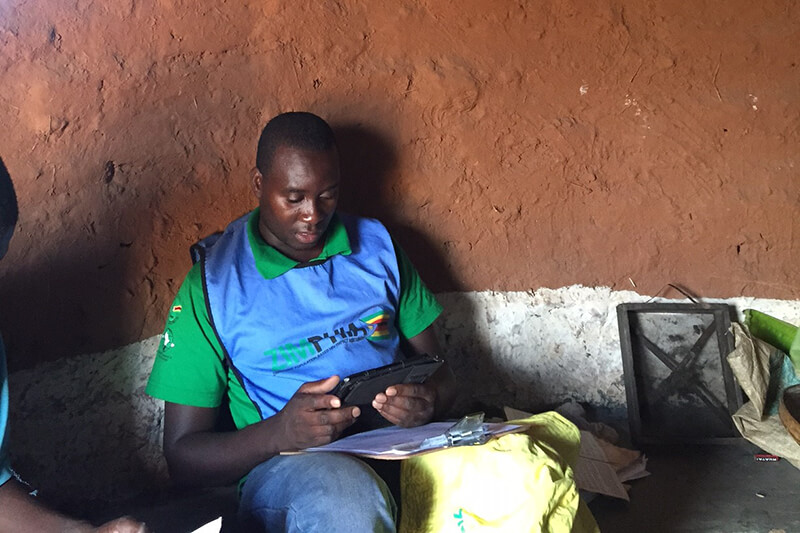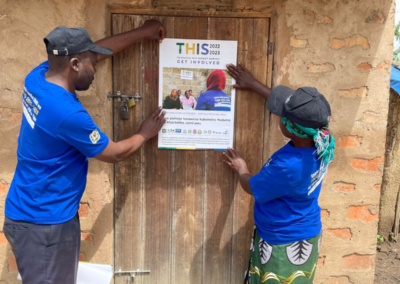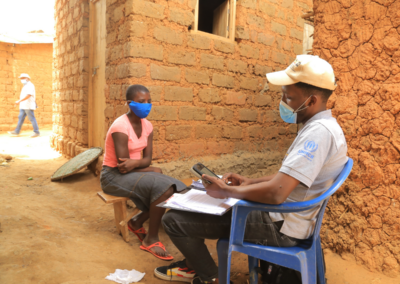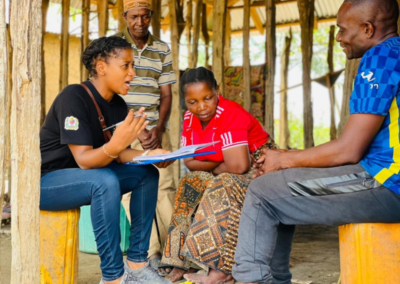After weeks of training and preparation, PHIA survey teams are on the ground in Zimbabwe and Malawi, equipped with tablet computers and wearing brightly colored t-shirts emblazoned with survey logos. Over the next six months, they will interview adults and children from approximately 15,000 randomly selected households in each country using pre-programmed tablets and portable blood testing equipment.
Tablet technology is a critical part of the PHIA Project, a multi-country initiative to assess the impact of scaled-up national HIV programs on the HIV epidemic in PEPFAR-supported countries. Funded by PEPFAR through the CDC, and implemented in partnership with CDC and key national stakeholders, ICAP plans to launch PHIA surveys in approximately 15 countries in Africa and the Caribbean over the next five years. ICAP, in collaboration with Westat, Inc., a PHIA Project partner with extensive experience collecting data on tablets, developed PHIA-specific apps using Open Data Kit, an open-source software, to collect high-quality data.
To date, teams have used tablets for household listing, a key planning step needed for survey implementation, in Malawi and Zambia. The teams found that it took much less time, only one month, to clean the electronic household listing data in Malawi compared to the six months needed for the paper-based household listing data in Zimbabwe. In addition to a faster time to clean data, the state-of-the-art tablets provide many advantages over paper-based methods, including portability, built-in checks to help reduce errors, and the ability to store all necessary forms in multiple languages.
In Zimbabwe, data collection started with 12 survey teams in October and scaled up to 20 teams in November; they are using 160 tablets programmed with questionnaires and consent forms in three languages created using Open Data Kit. Data collection started in Malawi (160 tablets, three languages) in November and will start in Zambia (260 tablets, eight languages) in December. All team members are trained to conduct interviews using the tablets.
The tablet has pre-programmed skip patterns in the survey questionnaire—meaning the program automatically moves to the most appropriate next question based on participants’ responses to earlier questions—to guide interviewers, and all data collected are uploaded to a central database server. Internet access is not required to complete the forms on the tablets, but only for uploading finalized forms. Portable routers, used to transmit data via Wi-Fi hotspots, maximize connectivity.
In addition, since there are approximately 15 different consents, assents, and permissions for each survey, each tablet includes custom applications that assign the correct consent and permission forms for each participant, based primarily on the age of the individual. Electronic signatures are collected for each form in the tablet, and a scanning app is used to link participant identification numbers with point-of-care testing results from pre-printed barcode labels for blood specimens.
The biomarker testing portion of the survey may include tests for syphilis and hepatitis B in addition to HIV. Survey staff collect blood samples and are guided by a built-in testing algorithm on the tablet that prompts when move on to the next appropriate step after the first HIV rapid test. For example, if the initial HIV test finds the blood sample is reactive, the tablet will instruct the tester to perform a confirmatory HIV test. If the first two HIV test results are discordant, the tablet will prompt the survey staff to conduct a third tie-breaker test.
To be sure, there have been a few technical challenges, such as occasional bugs in the application when revising or correcting forms and the need to hone the survey application within a short testing and review period. However, as the household listing exercises have already demonstrated, the tablets will improve efficiency and quickly provide clean data.










